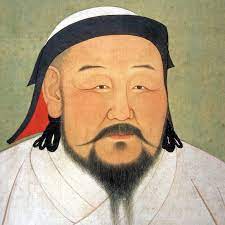

Adimchi
Genghis Khan
Genghis Khan, also known as Temujin, was the founder and first leader of the Mongol Empire, one of the largest empires in history. He is regarded as one of the most successful military leaders and strategists of all time, and his legacy continues to impact the world today.
Early Life
Genghis Khan was born in 1162 in the region now known as Mongolia. He was born into a clan called Borjigin and was the son of Yesugei, who was a chief of the clan. When Genghis Khan was nine years old, his father was poisoned by a rival clan, leaving him and his family vulnerable and unprotected. This event would shape Genghis Khan's life and fuel his desire for power and revenge.
As a young man, Genghis Khan endured many hardships and struggles. He was forced into slavery, escaped, and spent several years living in the wilderness, learning survival skills and honing his military and leadership abilities. He also formed alliances with other tribes and gained a reputation as a skilled warrior.
Rise to Power
In 1206, Genghis Khan was declared the leader of the Mongol tribes, which at the time were divided and in conflict with each other. He quickly set about unifying the tribes and consolidating his power. He established a code of laws, which were known as the Yassa, that governed all aspects of Mongol life, from military organization to social conduct. He also created a system of meritocracy, where individuals were promoted based on their abilities rather than their status or wealth.
Under Genghis Khan's leadership, the Mongol Empire began to expand rapidly. He led his armies on campaigns to conquer neighboring territories, including China, Russia, and Persia. His military tactics and strategies were innovative and effective, and he was able to defeat much larger and more powerful armies through his use of surprise attacks, feints, and psychological warfare.
Legacy
Genghis Khan's legacy is complex and controversial. On the one hand, he is celebrated as a national hero in Mongolia and is credited with unifying the Mongol tribes and establishing the foundations of the Mongol Empire. He is also remembered as a skilled military strategist and leader who was able to conquer vast territories and create a powerful empire.
On the other hand, Genghis Khan's conquests were brutal and resulted in the deaths of millions of people. His armies were notorious for their savagery and cruelty, and entire cities were often destroyed and their inhabitants massacred. The legacy of his empire is also mixed, with some arguing that it facilitated cultural and technological exchange and others pointing to the destruction and displacement that it caused.
Conclusion
In conclusion, Genghis Khan was a complex and influential figure in world history. His life and legacy continue to be studied and debated by historians and scholars around the world. While his conquests were marked by brutality and violence, his leadership and military strategies were also highly innovative and effective. Today, Genghis Khan remains a symbol of Mongolian identity and a reminder of the power and impact of human leadership and ambition.